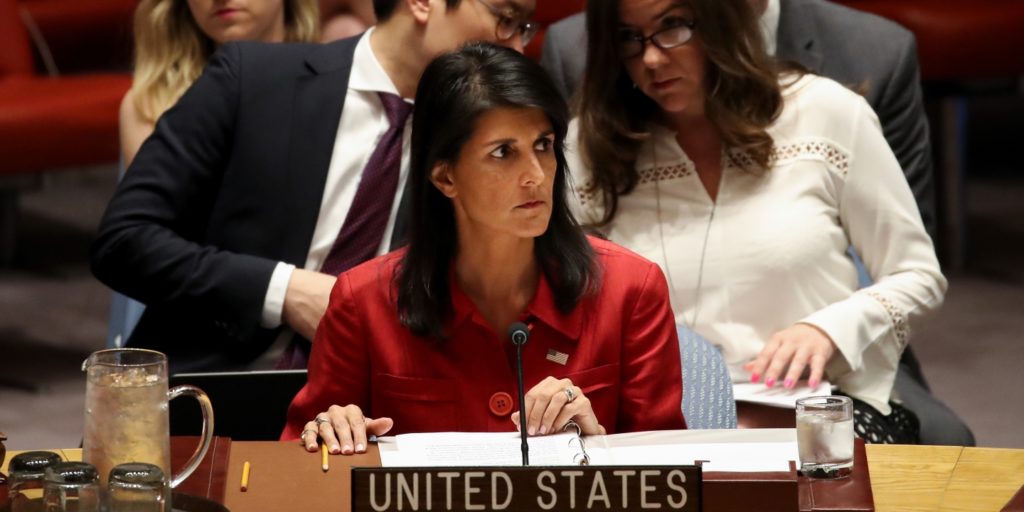The U.S. Voted Against a U.N. Resolution Condemning Death Penalty for LGBTQ People
ANGLO AMERICA, UNITED NATIONS, SEXUALITIES, 9 Oct 2017

Nikki Haley, United States ambassador to the United Nations, looks on during an emergency meeting of the U.N. Security Council at United Nations headquarters, July 5, 2017 in New York City.
3 Oct 2017 – President Donald Trump’s administration is facing strong backlash from civil rights groups after voting against a U.N. resolution that condemns using death penalty to punish “consensual same-sex relations.”
The U.N. Human Rights Council approved the measure on Friday with a 27-13 vote, with seven countries abstaining. The United States, led by Amb. Nikki Haley, voted for an amendment to the resolution that said the death penalty was not necessarily a human rights violation, and voted against amendments urging countries to stop using experimental drugs in executions.
The Human Rights Campaign called the vote “beyond disgraceful,” and former Obama national security advisor Susan Rice took aim at Trump:
Shame on US! I was proud to lead U.S. efforts at UN to protect LGBTQ people, back in the day when America stood for human rights for all 🇺🇸 https://t.co/3Y403bP7Wh
— Susan Rice (@AmbassadorRice) October 3, 2017
The Trump administration’s vote is nothing new — presidents from both parties have long objected to U.N. resolutions critical of capital punishment. In December 2016, for example — in the final weeks of Obama’s presidency — the U.S. voted against a resolution urging states not to execute minors, pregnant women, and the intellectually disabled.
While last week’s vote is not evidence of any significant policy change, it does show what kind of company the U.S. keeps among nations that support the death penalty. Twelve other countries joined the United States in voting against the resolution, including Egypt, which executes political dissidents, Ethiopia, which is considering the death penalty for same-sex activity, and Saudi Arabia, which, in 2015, beheaded more people than ISIS.
A 2014 report by Amnesty International found that even though the death penalty in on the books in one-third of the world’s countries, only nine countries have regularly used it in past years – including Iran, Sudan, China and North Korea. In other words, when the United States defends the death penalty, it defends the practice of some of the world’s worst human rights violators.
The U.S. Mission to the U.N. did not return a request for comment from The Intercept.
______________________________________
 Alex Emmons – alex.emmons@theintercept.com
Alex Emmons – alex.emmons@theintercept.com
Go to Original – theintercept.com
DISCLAIMER: The statements, views and opinions expressed in pieces republished here are solely those of the authors and do not necessarily represent those of TMS. In accordance with title 17 U.S.C. section 107, this material is distributed without profit to those who have expressed a prior interest in receiving the included information for research and educational purposes. TMS has no affiliation whatsoever with the originator of this article nor is TMS endorsed or sponsored by the originator. “GO TO ORIGINAL” links are provided as a convenience to our readers and allow for verification of authenticity. However, as originating pages are often updated by their originating host sites, the versions posted may not match the versions our readers view when clicking the “GO TO ORIGINAL” links. This site contains copyrighted material the use of which has not always been specifically authorized by the copyright owner. We are making such material available in our efforts to advance understanding of environmental, political, human rights, economic, democracy, scientific, and social justice issues, etc. We believe this constitutes a ‘fair use’ of any such copyrighted material as provided for in section 107 of the US Copyright Law. In accordance with Title 17 U.S.C. Section 107, the material on this site is distributed without profit to those who have expressed a prior interest in receiving the included information for research and educational purposes. For more information go to: http://www.law.cornell.edu/uscode/17/107.shtml. If you wish to use copyrighted material from this site for purposes of your own that go beyond ‘fair use’, you must obtain permission from the copyright owner.
Read more
Click here to go to the current weekly digest or pick another article:
ANGLO AMERICA:
UNITED NATIONS:
- Putin’s Proposed UN Control Over Ukraine Is Well Intentioned but Will Be Tough to Implement
- The Christian Zionist Leading the International Court of Justice
- UN Special Rapporteurs on Palestine Talk Truth to Power as Trump Takes Over the US Government
SEXUALITIES: